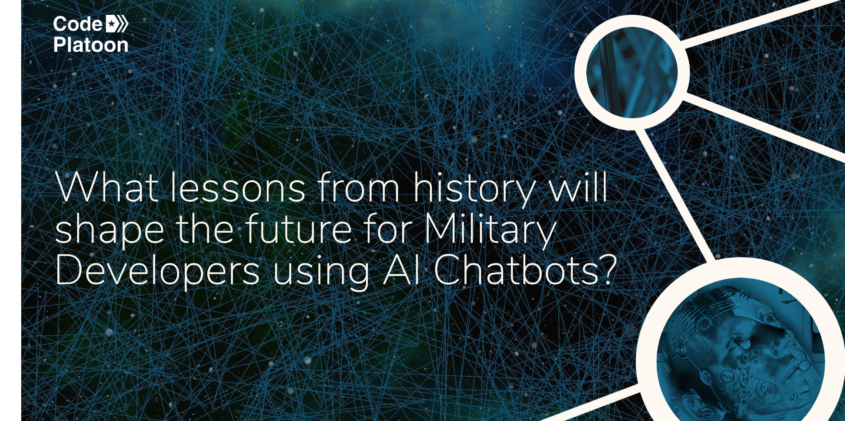What lessons from history will shape the future for military developers using AI Chatbots?
In the worlds of military development and software engineering, history provides valuable insights. As a former Airborne Infantryman and history buff, I like to research how my predecessors did things. The Sky Soldiers of WWII offer a great deal of inspiration, after all.
One of the questions I recently dug into was, How much gear did someone in the 101st Airborne carry when they jumped into Normandy on D-Day? I discovered that the weight carried into battle in 1944 was remarkably similar to my loadout as I walked the streets of places like Tikrit, Iraq – they just had less stuff.
Sixty to seventy pounds of gear on an average patrol has been standard for decades, but what composes that has changed a great deal. Advancements in technology have allowed us to carry much more ammunition, medical supplies, and food without a change in overall weight.
This development offers a significant lesson in the history of software engineering and technology. When reductions in size, weight, or cost (or all of these) occur, it rarely results in an overall net decrease in usage or less energy expended at the end goal. Instead, these advancements make coding more efficient, refining workflows and enabling tasks to be completed faster.
I offer this example to suggest that, given historical realities, technologies like AI Chatbots will not take the jobs of software developers and engineers. Rather, AI will enable them to increase the speed at which they accomplish tasks, so long as they adapt to the new technology. AI will help software engineers do more of what they are doing and do it more quickly and efficiently.
I recall using a calculator for the first time when I was about eight years old and thinking, Why do I need to learn math? Won’t this do it all for me?
Well, that was around 1981, and here we are in 2023 with mathematicians still in demand. Mathematics remains a highly respected field in academia and business, despite massive increases in machine computing ability at nearly everyone’s fingertips in the workforce.
Some may counter that AI is a substantial leap forward from my comparisons, possibly even one that eclipses all other advancements by orders of magnitude. I am not an expert in the field, so it is not my place to say whether that is true. Instead, I offer the following two points to consider.
First, be leery of anyone making absolutist claims about the unknown. In the last week, I’ve read statements that range from “AI Chatbots will kill us all” to “They are nothing more than a Wikipedia you can talk to.” Both extremes seem problematic, mainly because we don’t fully know yet.
Second, acquaint yourself early with new technologies if you want to work in the software engineering field (and probably even if you don’t). Learning to use and maximize a new technology will nearly always be better than remaining ignorant of it.
In other words, AI is not something to shy away from, so don’t let this new tool pass you by. Embrace the opportunity it presents by actively engaging with chatbots and learning how they can help you improve your software engineering skills.
Greg Drobny is a former Airborne Infantryman, PSYOP Team Chief, political consultant, professional military blogger, and Code Platoon’s Student Outreach and Recruitment Manager. He holds a BA and MA in history and an MS in organizational psychology. He is married with four children who keep him more than slightly busy, and is passionate about helping Veterans find their paths in life and develop the skills needed to pursue their goals.

